Drugs, Governance & Society: Legalisation vs Decriminalisation Essay
VerifiedAdded on 2022/10/17
|7
|1530
|277
Essay
AI Summary
This critical reflection essay examines the debate surrounding the legalisation or decriminalisation of drug use, focusing on the author's evolving perspective. Initially holding negative views on drug use, the author's understanding shifted after reviewing literature and policies in Australia and Portugal. The essay highlights preconceived ideas, the impact of criminalisation versus harm reduction approaches, and the influence of policies on public health and drug-related crime rates. It discusses the shift from criminal sanctions to non-criminal penalties, and the importance of treating drug abuse as a health issue. The author emphasizes the need for policy modification to provide better healthcare for drug users while considering the multifaceted challenges associated with drug abuse. The essay concludes by advocating for harm reduction strategies and non-criminal approaches to drug use, drawing on examples from Australia and Portugal to support this stance.
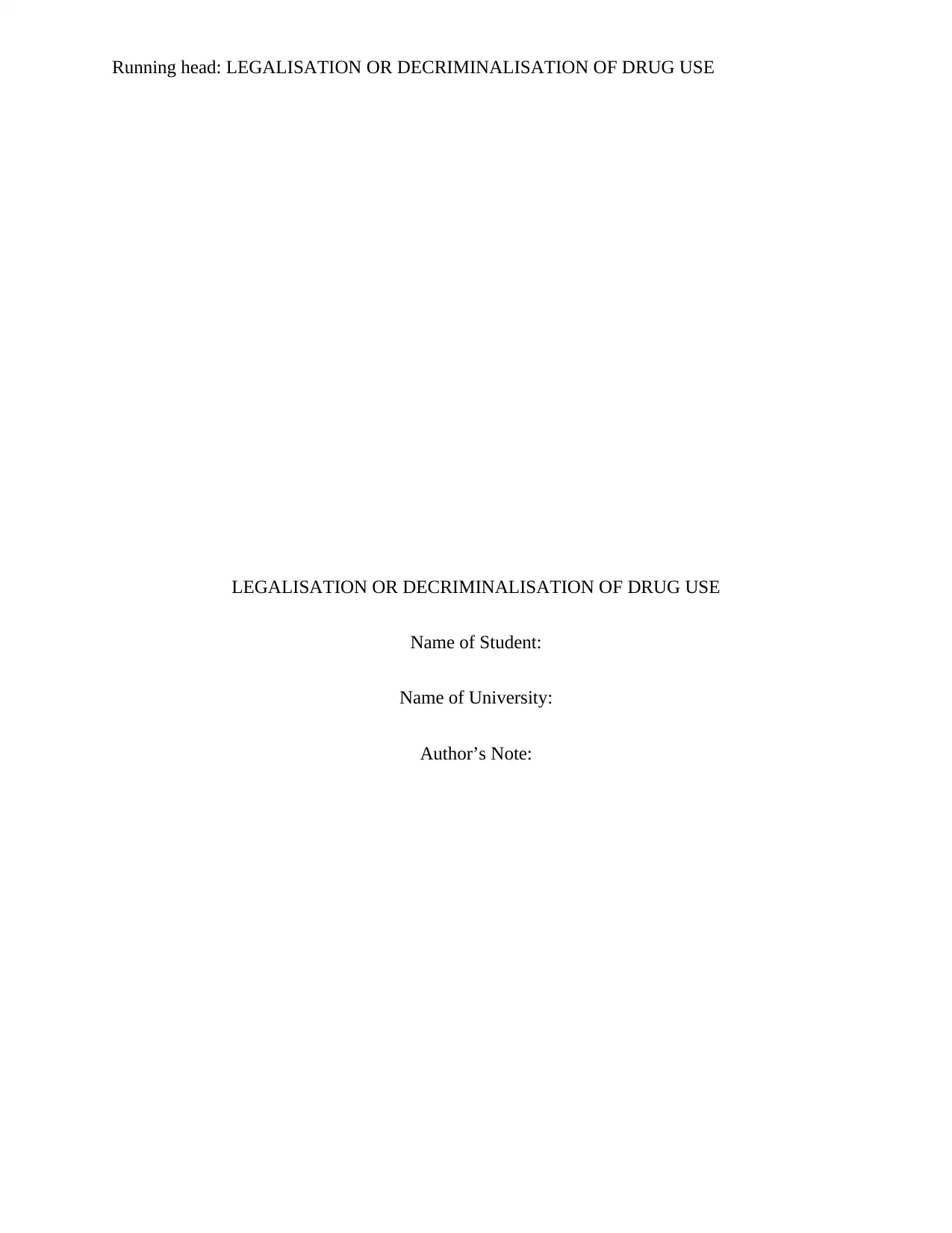
Running head: LEGALISATION OR DECRIMINALISATION OF DRUG USE
LEGALISATION OR DECRIMINALISATION OF DRUG USE
Name of Student:
Name of University:
Author’s Note:
LEGALISATION OR DECRIMINALISATION OF DRUG USE
Name of Student:
Name of University:
Author’s Note:
Paraphrase This Document
Need a fresh take? Get an instant paraphrase of this document with our AI Paraphraser
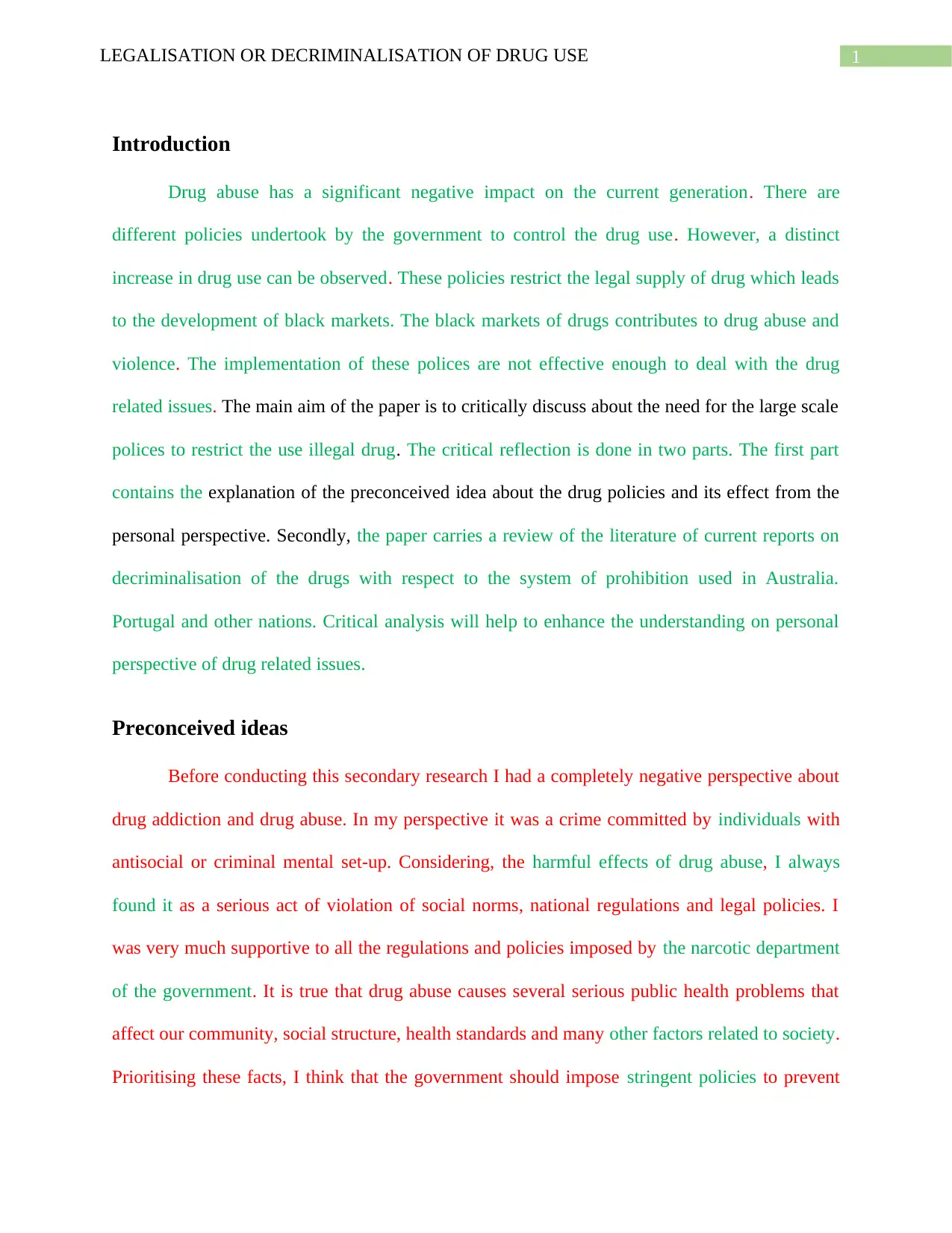
1LEGALISATION OR DECRIMINALISATION OF DRUG USE
Introduction
Drug abuse has a significant negative impact on the current generation. There are
different policies undertook by the government to control the drug use. However, a distinct
increase in drug use can be observed. These policies restrict the legal supply of drug which leads
to the development of black markets. The black markets of drugs contributes to drug abuse and
violence. The implementation of these polices are not effective enough to deal with the drug
related issues. The main aim of the paper is to critically discuss about the need for the large scale
polices to restrict the use illegal drug. The critical reflection is done in two parts. The first part
contains the explanation of the preconceived idea about the drug policies and its effect from the
personal perspective. Secondly, the paper carries a review of the literature of current reports on
decriminalisation of the drugs with respect to the system of prohibition used in Australia.
Portugal and other nations. Critical analysis will help to enhance the understanding on personal
perspective of drug related issues.
Preconceived ideas
Before conducting this secondary research I had a completely negative perspective about
drug addiction and drug abuse. In my perspective it was a crime committed by individuals with
antisocial or criminal mental set-up. Considering, the harmful effects of drug abuse, I always
found it as a serious act of violation of social norms, national regulations and legal policies. I
was very much supportive to all the regulations and policies imposed by the narcotic department
of the government. It is true that drug abuse causes several serious public health problems that
affect our community, social structure, health standards and many other factors related to society.
Prioritising these facts, I think that the government should impose stringent policies to prevent
Introduction
Drug abuse has a significant negative impact on the current generation. There are
different policies undertook by the government to control the drug use. However, a distinct
increase in drug use can be observed. These policies restrict the legal supply of drug which leads
to the development of black markets. The black markets of drugs contributes to drug abuse and
violence. The implementation of these polices are not effective enough to deal with the drug
related issues. The main aim of the paper is to critically discuss about the need for the large scale
polices to restrict the use illegal drug. The critical reflection is done in two parts. The first part
contains the explanation of the preconceived idea about the drug policies and its effect from the
personal perspective. Secondly, the paper carries a review of the literature of current reports on
decriminalisation of the drugs with respect to the system of prohibition used in Australia.
Portugal and other nations. Critical analysis will help to enhance the understanding on personal
perspective of drug related issues.
Preconceived ideas
Before conducting this secondary research I had a completely negative perspective about
drug addiction and drug abuse. In my perspective it was a crime committed by individuals with
antisocial or criminal mental set-up. Considering, the harmful effects of drug abuse, I always
found it as a serious act of violation of social norms, national regulations and legal policies. I
was very much supportive to all the regulations and policies imposed by the narcotic department
of the government. It is true that drug abuse causes several serious public health problems that
affect our community, social structure, health standards and many other factors related to society.
Prioritising these facts, I think that the government should impose stringent policies to prevent
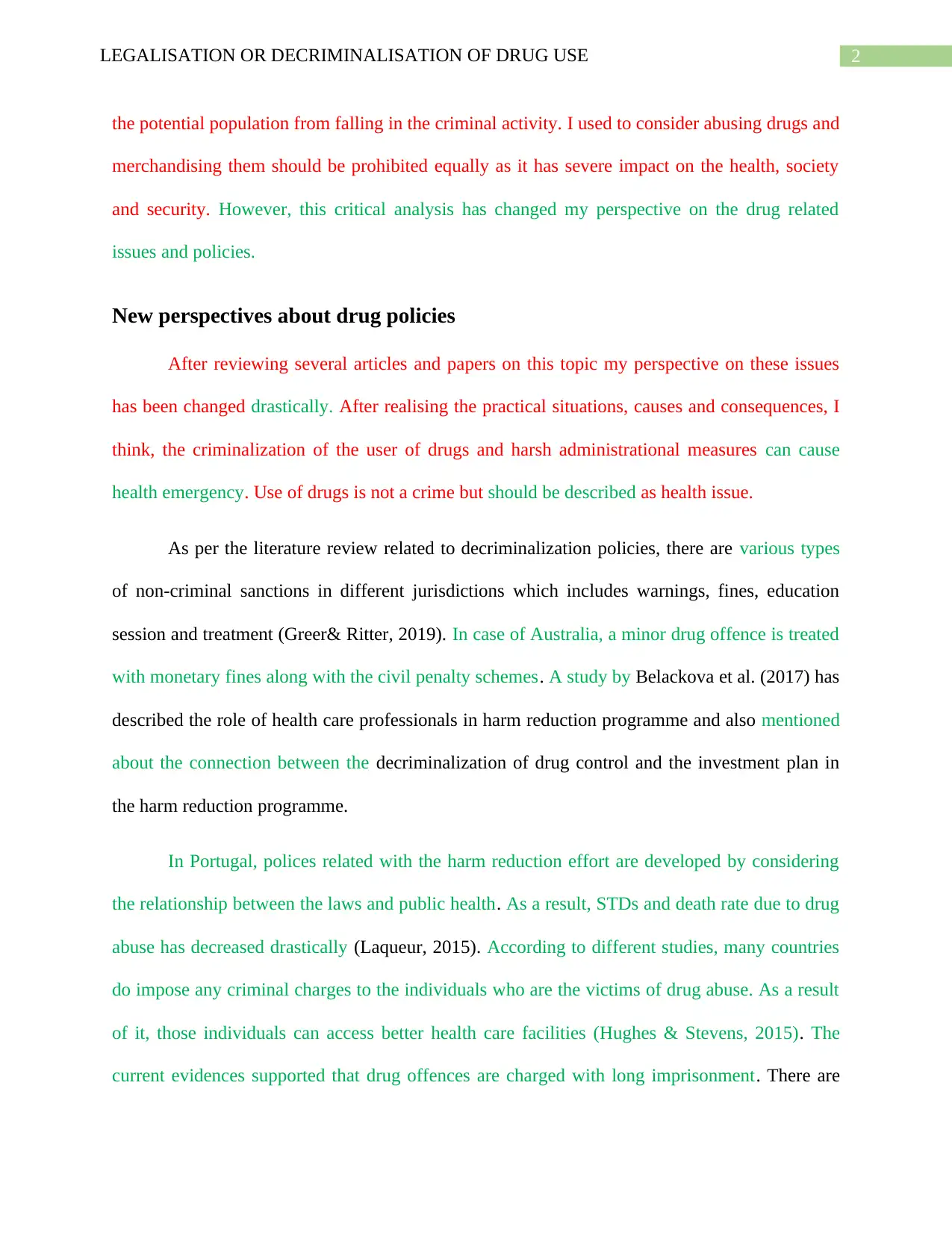
2LEGALISATION OR DECRIMINALISATION OF DRUG USE
the potential population from falling in the criminal activity. I used to consider abusing drugs and
merchandising them should be prohibited equally as it has severe impact on the health, society
and security. However, this critical analysis has changed my perspective on the drug related
issues and policies.
New perspectives about drug policies
After reviewing several articles and papers on this topic my perspective on these issues
has been changed drastically. After realising the practical situations, causes and consequences, I
think, the criminalization of the user of drugs and harsh administrational measures can cause
health emergency. Use of drugs is not a crime but should be described as health issue.
As per the literature review related to decriminalization policies, there are various types
of non-criminal sanctions in different jurisdictions which includes warnings, fines, education
session and treatment (Greer& Ritter, 2019). In case of Australia, a minor drug offence is treated
with monetary fines along with the civil penalty schemes. A study by Belackova et al. (2017) has
described the role of health care professionals in harm reduction programme and also mentioned
about the connection between the decriminalization of drug control and the investment plan in
the harm reduction programme.
In Portugal, polices related with the harm reduction effort are developed by considering
the relationship between the laws and public health. As a result, STDs and death rate due to drug
abuse has decreased drastically (Laqueur, 2015). According to different studies, many countries
do impose any criminal charges to the individuals who are the victims of drug abuse. As a result
of it, those individuals can access better health care facilities (Hughes & Stevens, 2015). The
current evidences supported that drug offences are charged with long imprisonment. There are
the potential population from falling in the criminal activity. I used to consider abusing drugs and
merchandising them should be prohibited equally as it has severe impact on the health, society
and security. However, this critical analysis has changed my perspective on the drug related
issues and policies.
New perspectives about drug policies
After reviewing several articles and papers on this topic my perspective on these issues
has been changed drastically. After realising the practical situations, causes and consequences, I
think, the criminalization of the user of drugs and harsh administrational measures can cause
health emergency. Use of drugs is not a crime but should be described as health issue.
As per the literature review related to decriminalization policies, there are various types
of non-criminal sanctions in different jurisdictions which includes warnings, fines, education
session and treatment (Greer& Ritter, 2019). In case of Australia, a minor drug offence is treated
with monetary fines along with the civil penalty schemes. A study by Belackova et al. (2017) has
described the role of health care professionals in harm reduction programme and also mentioned
about the connection between the decriminalization of drug control and the investment plan in
the harm reduction programme.
In Portugal, polices related with the harm reduction effort are developed by considering
the relationship between the laws and public health. As a result, STDs and death rate due to drug
abuse has decreased drastically (Laqueur, 2015). According to different studies, many countries
do impose any criminal charges to the individuals who are the victims of drug abuse. As a result
of it, those individuals can access better health care facilities (Hughes & Stevens, 2015). The
current evidences supported that drug offences are charged with long imprisonment. There are
⊘ This is a preview!⊘
Do you want full access?
Subscribe today to unlock all pages.

Trusted by 1+ million students worldwide
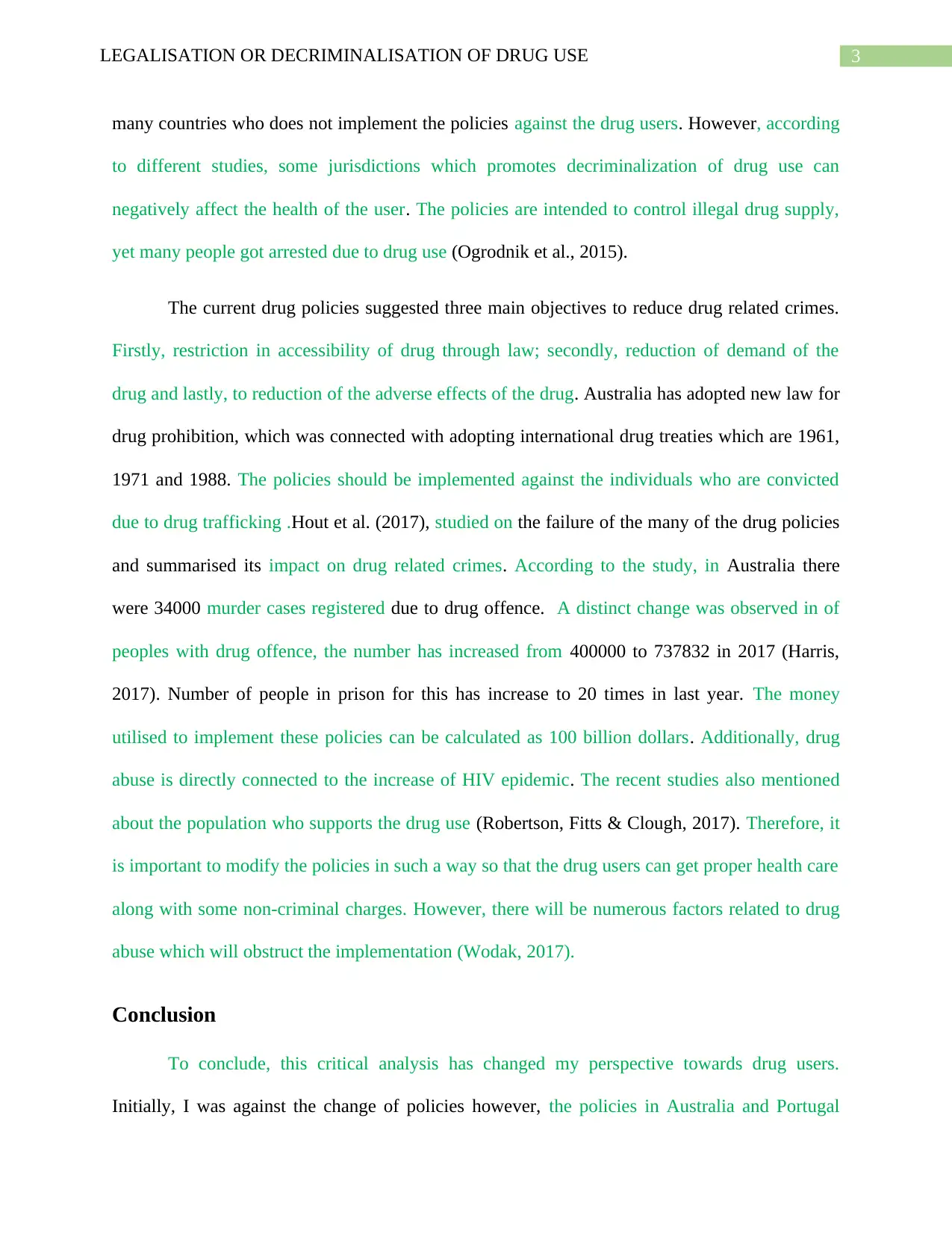
3LEGALISATION OR DECRIMINALISATION OF DRUG USE
many countries who does not implement the policies against the drug users. However, according
to different studies, some jurisdictions which promotes decriminalization of drug use can
negatively affect the health of the user. The policies are intended to control illegal drug supply,
yet many people got arrested due to drug use (Ogrodnik et al., 2015).
The current drug policies suggested three main objectives to reduce drug related crimes.
Firstly, restriction in accessibility of drug through law; secondly, reduction of demand of the
drug and lastly, to reduction of the adverse effects of the drug. Australia has adopted new law for
drug prohibition, which was connected with adopting international drug treaties which are 1961,
1971 and 1988. The policies should be implemented against the individuals who are convicted
due to drug trafficking .Hout et al. (2017), studied on the failure of the many of the drug policies
and summarised its impact on drug related crimes. According to the study, in Australia there
were 34000 murder cases registered due to drug offence. A distinct change was observed in of
peoples with drug offence, the number has increased from 400000 to 737832 in 2017 (Harris,
2017). Number of people in prison for this has increase to 20 times in last year. The money
utilised to implement these policies can be calculated as 100 billion dollars. Additionally, drug
abuse is directly connected to the increase of HIV epidemic. The recent studies also mentioned
about the population who supports the drug use (Robertson, Fitts & Clough, 2017). Therefore, it
is important to modify the policies in such a way so that the drug users can get proper health care
along with some non-criminal charges. However, there will be numerous factors related to drug
abuse which will obstruct the implementation (Wodak, 2017).
Conclusion
To conclude, this critical analysis has changed my perspective towards drug users.
Initially, I was against the change of policies however, the policies in Australia and Portugal
many countries who does not implement the policies against the drug users. However, according
to different studies, some jurisdictions which promotes decriminalization of drug use can
negatively affect the health of the user. The policies are intended to control illegal drug supply,
yet many people got arrested due to drug use (Ogrodnik et al., 2015).
The current drug policies suggested three main objectives to reduce drug related crimes.
Firstly, restriction in accessibility of drug through law; secondly, reduction of demand of the
drug and lastly, to reduction of the adverse effects of the drug. Australia has adopted new law for
drug prohibition, which was connected with adopting international drug treaties which are 1961,
1971 and 1988. The policies should be implemented against the individuals who are convicted
due to drug trafficking .Hout et al. (2017), studied on the failure of the many of the drug policies
and summarised its impact on drug related crimes. According to the study, in Australia there
were 34000 murder cases registered due to drug offence. A distinct change was observed in of
peoples with drug offence, the number has increased from 400000 to 737832 in 2017 (Harris,
2017). Number of people in prison for this has increase to 20 times in last year. The money
utilised to implement these policies can be calculated as 100 billion dollars. Additionally, drug
abuse is directly connected to the increase of HIV epidemic. The recent studies also mentioned
about the population who supports the drug use (Robertson, Fitts & Clough, 2017). Therefore, it
is important to modify the policies in such a way so that the drug users can get proper health care
along with some non-criminal charges. However, there will be numerous factors related to drug
abuse which will obstruct the implementation (Wodak, 2017).
Conclusion
To conclude, this critical analysis has changed my perspective towards drug users.
Initially, I was against the change of policies however, the policies in Australia and Portugal
Paraphrase This Document
Need a fresh take? Get an instant paraphrase of this document with our AI Paraphraser
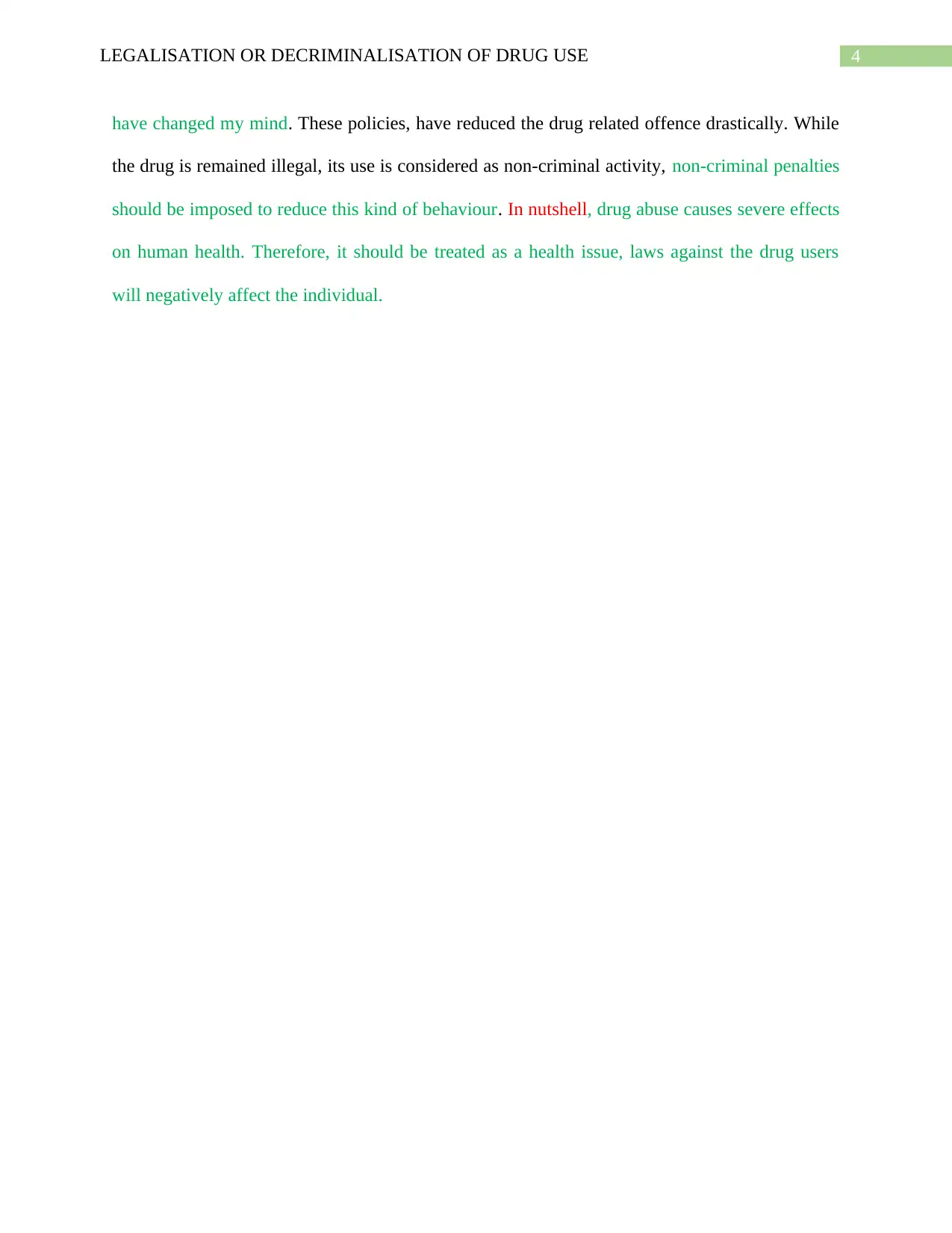
4LEGALISATION OR DECRIMINALISATION OF DRUG USE
have changed my mind. These policies, have reduced the drug related offence drastically. While
the drug is remained illegal, its use is considered as non-criminal activity, non-criminal penalties
should be imposed to reduce this kind of behaviour. In nutshell, drug abuse causes severe effects
on human health. Therefore, it should be treated as a health issue, laws against the drug users
will negatively affect the individual.
have changed my mind. These policies, have reduced the drug related offence drastically. While
the drug is remained illegal, its use is considered as non-criminal activity, non-criminal penalties
should be imposed to reduce this kind of behaviour. In nutshell, drug abuse causes severe effects
on human health. Therefore, it should be treated as a health issue, laws against the drug users
will negatively affect the individual.
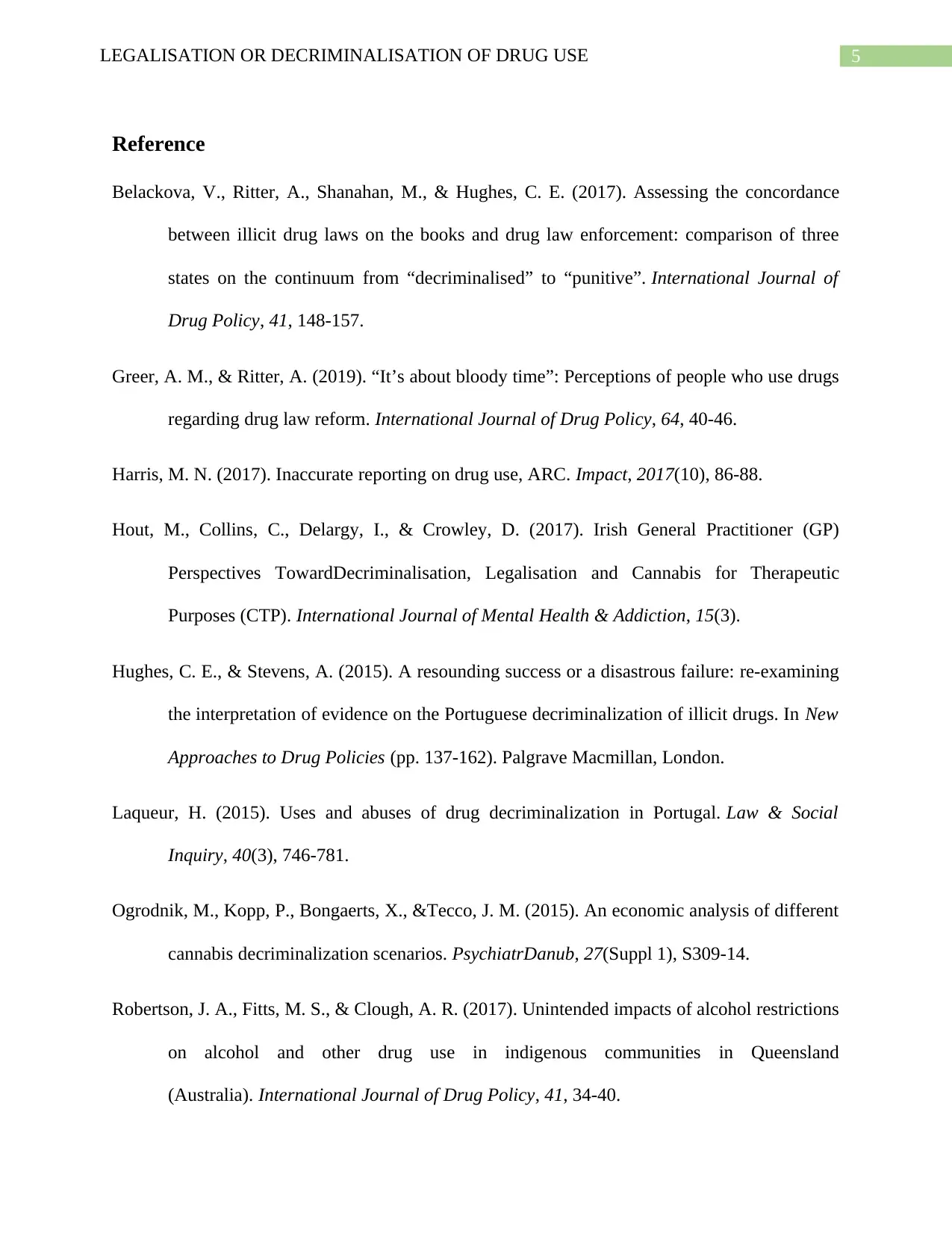
5LEGALISATION OR DECRIMINALISATION OF DRUG USE
Reference
Belackova, V., Ritter, A., Shanahan, M., & Hughes, C. E. (2017). Assessing the concordance
between illicit drug laws on the books and drug law enforcement: comparison of three
states on the continuum from “decriminalised” to “punitive”. International Journal of
Drug Policy, 41, 148-157.
Greer, A. M., & Ritter, A. (2019). “It’s about bloody time”: Perceptions of people who use drugs
regarding drug law reform. International Journal of Drug Policy, 64, 40-46.
Harris, M. N. (2017). Inaccurate reporting on drug use, ARC. Impact, 2017(10), 86-88.
Hout, M., Collins, C., Delargy, I., & Crowley, D. (2017). Irish General Practitioner (GP)
Perspectives TowardDecriminalisation, Legalisation and Cannabis for Therapeutic
Purposes (CTP). International Journal of Mental Health & Addiction, 15(3).
Hughes, C. E., & Stevens, A. (2015). A resounding success or a disastrous failure: re-examining
the interpretation of evidence on the Portuguese decriminalization of illicit drugs. In New
Approaches to Drug Policies (pp. 137-162). Palgrave Macmillan, London.
Laqueur, H. (2015). Uses and abuses of drug decriminalization in Portugal. Law & Social
Inquiry, 40(3), 746-781.
Ogrodnik, M., Kopp, P., Bongaerts, X., &Tecco, J. M. (2015). An economic analysis of different
cannabis decriminalization scenarios. PsychiatrDanub, 27(Suppl 1), S309-14.
Robertson, J. A., Fitts, M. S., & Clough, A. R. (2017). Unintended impacts of alcohol restrictions
on alcohol and other drug use in indigenous communities in Queensland
(Australia). International Journal of Drug Policy, 41, 34-40.
Reference
Belackova, V., Ritter, A., Shanahan, M., & Hughes, C. E. (2017). Assessing the concordance
between illicit drug laws on the books and drug law enforcement: comparison of three
states on the continuum from “decriminalised” to “punitive”. International Journal of
Drug Policy, 41, 148-157.
Greer, A. M., & Ritter, A. (2019). “It’s about bloody time”: Perceptions of people who use drugs
regarding drug law reform. International Journal of Drug Policy, 64, 40-46.
Harris, M. N. (2017). Inaccurate reporting on drug use, ARC. Impact, 2017(10), 86-88.
Hout, M., Collins, C., Delargy, I., & Crowley, D. (2017). Irish General Practitioner (GP)
Perspectives TowardDecriminalisation, Legalisation and Cannabis for Therapeutic
Purposes (CTP). International Journal of Mental Health & Addiction, 15(3).
Hughes, C. E., & Stevens, A. (2015). A resounding success or a disastrous failure: re-examining
the interpretation of evidence on the Portuguese decriminalization of illicit drugs. In New
Approaches to Drug Policies (pp. 137-162). Palgrave Macmillan, London.
Laqueur, H. (2015). Uses and abuses of drug decriminalization in Portugal. Law & Social
Inquiry, 40(3), 746-781.
Ogrodnik, M., Kopp, P., Bongaerts, X., &Tecco, J. M. (2015). An economic analysis of different
cannabis decriminalization scenarios. PsychiatrDanub, 27(Suppl 1), S309-14.
Robertson, J. A., Fitts, M. S., & Clough, A. R. (2017). Unintended impacts of alcohol restrictions
on alcohol and other drug use in indigenous communities in Queensland
(Australia). International Journal of Drug Policy, 41, 34-40.
⊘ This is a preview!⊘
Do you want full access?
Subscribe today to unlock all pages.

Trusted by 1+ million students worldwide
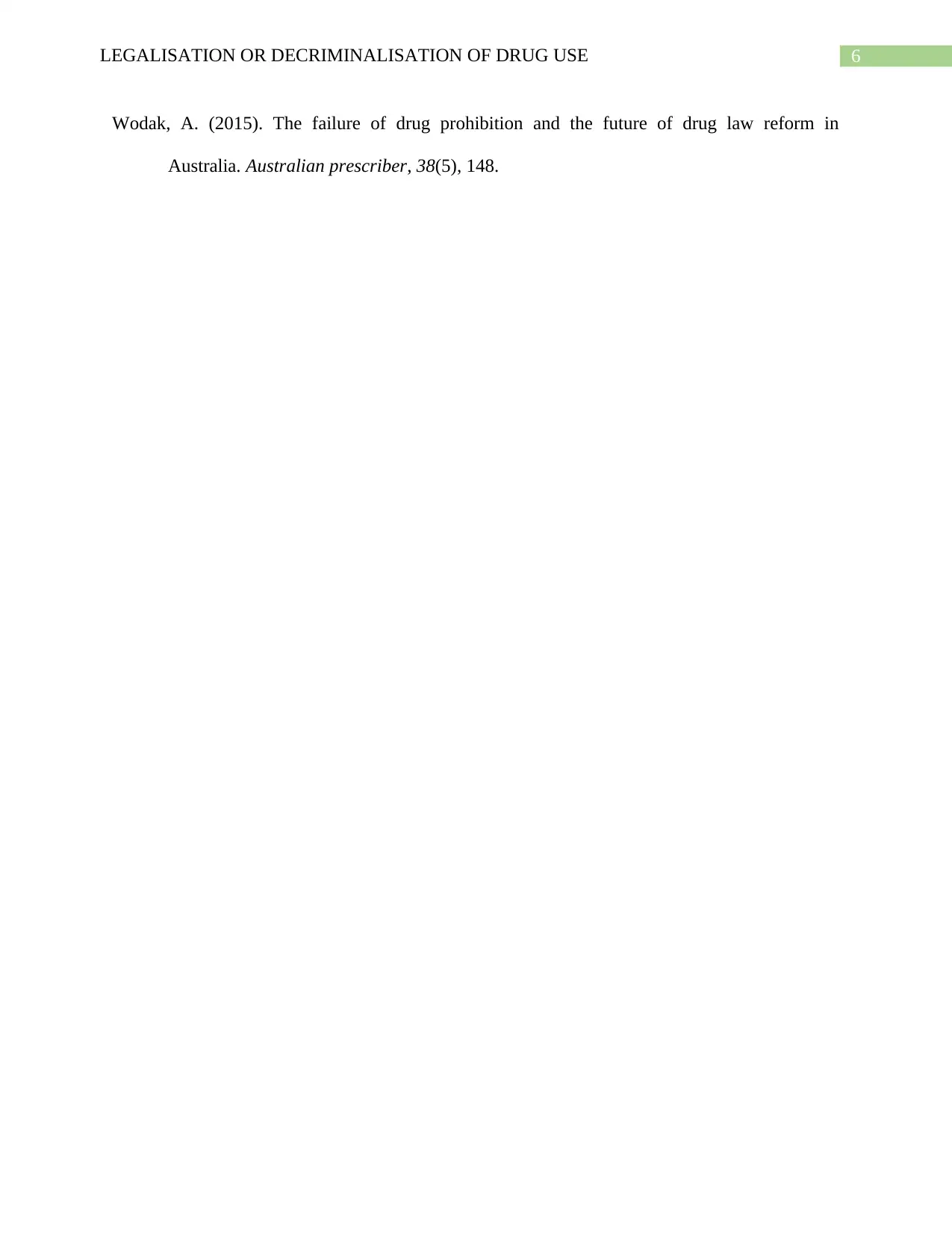
6LEGALISATION OR DECRIMINALISATION OF DRUG USE
Wodak, A. (2015). The failure of drug prohibition and the future of drug law reform in
Australia. Australian prescriber, 38(5), 148.
Wodak, A. (2015). The failure of drug prohibition and the future of drug law reform in
Australia. Australian prescriber, 38(5), 148.
1 out of 7
Related Documents
Your All-in-One AI-Powered Toolkit for Academic Success.
+13062052269
info@desklib.com
Available 24*7 on WhatsApp / Email
![[object Object]](/_next/static/media/star-bottom.7253800d.svg)
Unlock your academic potential
Copyright © 2020–2025 A2Z Services. All Rights Reserved. Developed and managed by ZUCOL.





